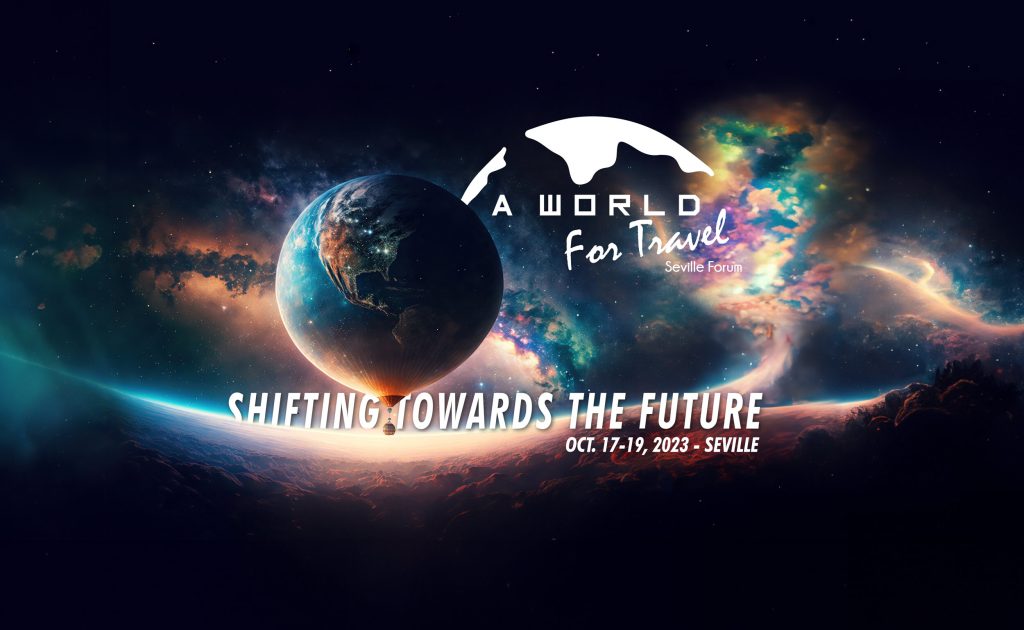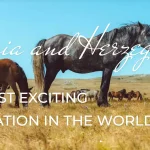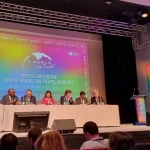October 18. Seville – The 4th edition of A World for Travel, the international event dedicated to the sustainable transformation of the travel industry kicks off today in Seville, Spain, alongside the Tourism Innovation Summit. At a press conference yesterday evening, travel industry leaders shared their groundbreaking initiatives but called on the industry to react more quickly to the many challenges of sustainability.
TCN has taken to learn and listen to these important conversations for the second year. “The sustainable transformation of travel and tourism requires consistency, determination, foresight, and leadership and most of all, time, and money. This transformation is inevitable. While the world is increasingly unstable, we need to collaborate and clarify issues that prioritize investment in research in order to facilitate faster change,” said Christian Delom, Secretary General, AWFT23.
Dozens of experts will meet at Fibes Convention Hall in Seville, to share their expertise and visions on the profound and essential actions required to make travel more sustainable. “Contrary to popular belief, technology will be part of the solution of the new tourism. Our presence at TIS is no coincidence,” said Frédéric Vanhoutte, CEO of Eventiz Media Group, initiator of the international forum.
Among the major questions that will be addressed during the forum, is that of transportation and the marketplace’s inability to produce and distribute sustainable aviation fuels (SAFs) in the quantities necessary. Longer term, industries are looking at hydrogen and electricity. But these options are decades away due to lack of funding in research and development. Industry SDG goals for 2050 are under severe threat.
Currently, less than 1% of aviation fuel is SAF and in the maritime sector, it is only just beginning. In addition to production and distribution issues, there is widespread uncertainty about the impact of SAFs on the performance of planes and ships.
The Travel Industry’s Response
Yet the travel industry continues to create major environmental impact and is an important contributor to climate change due to its consumption of resources such as fuel and water. According to the World Travel and Tourism Council, the industry accounted for 9% of global greenhouse gas emissions. This is mainly due to the large amount of energy used by the various forms of transport.
The industry has been responding with scores of initiatives, many of which will be discussed at the Seville Forum such as the Radisson Hotel Group’s expansive programs leading sustainability in hospitality. Inge Huijbrechts, the Group’s Global SVP Sustainability, Security and Corporate Communications, said, “With travel almost back to pre-pandemic levels albeit in these times of geopolitical uncertainty, we have a responsibility to come together as an industry, to stimulate both the green and digital transformation across all verticals. As a leading global hotel company, we have committed to become Net Zero by 2050, with targets based in science and through participation in various industry initiatives growing responsible tourism based on trusted, verified sustainability labels for hotels, such as Hotel Sustainability Basics and the Pathway to Net Positive Hospitality.”
Among other major initiatives discussed, Amadeus’ cross sector collaborative efforts on data, AAA Partner’s creative product development and the EU Commission’s efforts with the Green Deal. Lucas Bobes, Group Environmental Officer & Head of ESG Reporting at Amadeus said, “Amadeus facilitates travel arrangements for more than 400 million people per year. We want to provide sustainability related information to these travelers so they can make more informed choices and encourage them to choose the most sustainable travel options. At the same time, our technology helps travel providers improve their operational and environmental performance.”
Alastair Crossley, Head of Travel Solutions at AAA Partners, said: “As an innovative company standing by customers when they travel, it made sense to us to be at this forum. Every day, we are at the side of individuals, answering to their needs and in accordance to the shift of the industry. Indeed, since the Covid global pandemic, consumer behaviours evolved and adapted, and we saw some new habits arise like Bleisure travel, where people travel for business and then stay for leisure. The Millenials and Gen Z are the fastest growing segments and they will represent 50% of all travelers by 2025, we will thus need to adapt our solutions and ways to support them. Travelers also ask for more sustainable trips, destination travels that are part of their bucket list, with more unusual spots where climate risks have to be part of the equation. All these changes need to be tailored into ad-hoc protection travel offerings. At AXA Partners, as a global travel insurer delivering assistance services, we anticipate that the protection needs will increase and need to evolve likewise.”
The sustainability Challenge
The event splits the sustainability challenge into five areas: environment, climate, economic, technical and societal. In doing so the organizers are able to deep dive into the nuances of the categories. As the travel industry’s environmental impact continues to worsen, it is important for all parts of the travel ecosystem to respond quickly to the sustainability challenge. This means implementing meaningful initiatives that can have an immediate impact.
The A World For Travel event also challenges the industry to address the necessary confluence of safety, security and sustainability. “For decades studies show that travellers’ number one concern is safety but by looking at sustainability separately from safety, the industry is missing the point that there is no safety without sustainability,” stated Laurie Myers of the event partner, the Global Travel and Tourism Resilience Council.
Recommendations coming from the Seville event will include:
- Develop more surface travel products, more eco-friendly modes of transport.
- Communicate and merge sustainability with safety and security.
- Prepare for price increases, notably carbon pricing, to fund more R&D to develop renewable energy sources and water conservation efforts.
- Make sustainability a priority through corporate policies, goals and strategies. Travel policies need to be in line with sustainability goals and training needs to be internal as well as external.
- Cross sector collaboration needs to proliferate so consensus on terminology, measurement and response is reached as fast as possible.
By taking these steps, the travel industry can further reduce its environmental impact and become more sustainable to compensate for the delay in access to sustainable fuel output. Finally, new to A
World For Travel 2023 is the recognition and awarding of trophies for businesses that have truly made a difference. Their thought leadership is recognized and rewarded to amplify their actions globally.
About A World for Travel
A World for Travel is aimed at the transformation of travel to preserve, globally and locally, humanity and the planet. This event allows all tourism stakeholders to react, take initiative and reshape tourism products to meet climate, digital and social requirements, to develop the benefits of tourism and to fix ongoing milestones. The event provides a common platform to share best practices and perspectives by involving all stakeholders with mixed interests and identifying threats to travel development.
About the Global Travel and Tourism Resilience Council
In 2016, the Global Travel and Tourism Resilience Council was launched. The Council is a global platform to bring together the public and private sectors addressing crisis planning, preparedness, sustainability, recovery, and resilience. As an international thought leadership forum, the Council facilitates dialogue and works with best of breed companies for the benefit of destinations and the global travel industry.











